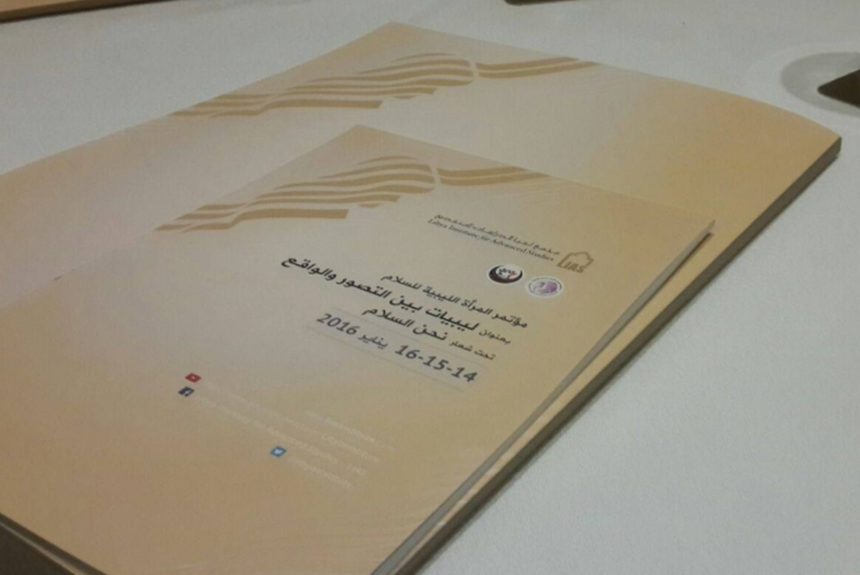A groundbreaking conference of Libyan women grassroots social society activists opened in Tunis on Thursday 14 January 2016. “Libyan Women Between Hope and Reality” was organized by Libya Institute for Advanced Studies in association with The Free Communications Organization (Jameeat Tawassul) and Voice of Truth for Libyan Women (Saut Al Haqq li’l Nisaa’i Libyeen) and brought more than 80 delegates together from throughout Libya.
“Women have a great contribution to make in restoring peace in Libya and healing the wounds of civil strife,” said Mohamed Htewish, Director of Libya Institute for Advanced Studies. “This is the first major event for Libyan women who live inside Libya since 2014 and the first event ever to focus on civil society organizations for women. This conference is the first in what we hope will be a series of engagements that will bring civil society organizations together and build networks of women activists from all parts of Libya.”
The conference opened with a visual presentation of women who have had a genuine impact on the history of Libya, like Queen Morena and other women writers, activists and militants who have made their mark on the country. This was followed by a speech from United Nations constitutional advisor Mohamed Ghannam who delivered a detailed explanation of the foundations for the transition and the constitution in progress. He highlighted the current and main obstacles faced by the parliament, insisting on the importance of respecting due dates for the final submission of the draft.
Some of the major questions from the participants revolved around worst-case scenarios, in which the role of the UN and civil society becomes paramount.
Most women delegates openly expressed their fear of the current security situation in Libya.
The second session was led by Raja Al Abassi, UNESCO project representative in Libya, who discussed the role of media in changing the image of Libyan women as second class citizens, and especially the stereotype of the woman as a mother, sister, wife or divorcee and not as an individual. According to Al Abassi, it is through media that women can set the agenda and make their voices heard, and more importantly create change through pressure and public awareness.
The third session of the first day on “Women, Peace and Security,” presented by Amina Rachid UN representative on the CEDAW 13/25 convention. Her presentation covered the importance of the participation of women in solving conflicts, and decision-making. The delegates commented that participation isn’t possible unless there is a wholesale change in culture, heritage and more importantly, education. The educational system and curriculum has to remove all texts and images that denigrate women in any way.
United Nations Director of the Women’s Division Majda Snoussi spoke on Libyan women in the face of declining security and on women’s rights in general. She called on international assistance to secure Libya from extremism and terrorism, and to help women become active participants in social peace.
Civil society activist Hala Al Musrati led the final session of the day comparing Rwanda to the current situation in Libya. Rwandan women suffered catastrophic atrocities during the 100-day Rwandan Genocide in 1994. In the aftermath of this human tragedy, Rwanda was transformed. By 2014, the country succeeded not only to secure borders but also to lead the largest participation of women in parliament by 60%. Al Musrati’s message was that Libyan women have all the potential, ambition and willingness to become the nexus of change.
“The sessions today were vibrant, thought provoking and inspiring,” said Mohamed Htewish. “We look forward to the next two days.”


